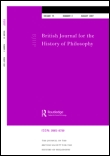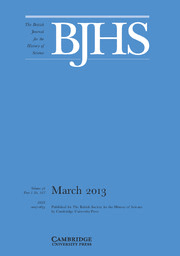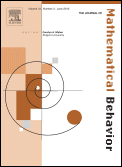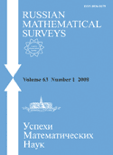
British Journal for the History of Mathematics
Scope & Guideline
Bridging Past and Present in Mathematical Discourse
Introduction
Aims and Scopes
- Historical Contextualization of Mathematics:
The journal emphasizes the importance of situating mathematical developments within their broader historical, cultural, and social contexts, exploring how historical events influenced mathematical ideas. - Interdisciplinary Approaches:
It encourages contributions that draw from various disciplines such as philosophy, sociology, and education, showcasing how these fields intersect with the history of mathematics. - Focus on Notable Figures:
The journal frequently highlights the contributions of significant historical figures in mathematics, examining their work and influence on contemporary mathematical practices. - Exploration of Mathematical Texts and Instruments:
Research on historical mathematical texts, instruments, and their applications is a core area, providing insights into the methodologies and practices of mathematicians throughout history. - Mathematics Education History:
The journal also explores the evolution of mathematics education, assessing historical pedagogical approaches and their implications for contemporary education.
Trending and Emerging
- Impact of Technology on Mathematics:
There is a growing interest in how technological advancements, such as generative AI, influence the understanding and teaching of historical mathematics, suggesting a trend towards integrating modern technologies into historical analysis. - Gender and Diversity in Mathematics:
Recent studies increasingly focus on the contributions of women and underrepresented groups in mathematics, highlighting the importance of inclusivity in the historical narrative of the discipline. - Mathematics and Other Disciplines:
Emerging themes explore the intersections of mathematics with music, philosophy, and literature, indicating a trend towards interdisciplinary studies that enrich the historical understanding of mathematics. - Public Engagement with Mathematics:
There is a rising trend in exploring how mathematics has been communicated to the public through mediums such as banknotes, reflecting a broader interest in the societal implications of mathematical ideas. - Historical Analysis of Mathematics Education:
An increased focus on the history of mathematics education practices suggests a trend towards understanding how historical pedagogical methods can inform current educational practices and policies.
Declining or Waning
- Purely Theoretical Mathematical Concepts:
There has been a noticeable decline in papers focusing solely on abstract mathematical theories without historical context, suggesting a shift towards more applied and contextually rich explorations. - Localized Historical Studies:
Studies that focus on very localized or niche historical contexts within mathematics appear to be waning, as the journal seems to favor broader, more globally relevant themes. - Mathematical Biographies:
While biographical studies of mathematicians were once more common, there seems to be a trend towards collective biographies or thematic explorations rather than individual life stories.
Similar Journals

Bulletin of the Korean Mathematical Society
Connecting Scholars Through MathematicsThe Bulletin of the Korean Mathematical Society is a premier journal published by the Korean Mathematical Society, aimed at disseminating significant advancements in the field of mathematics. With its ISSN 1015-8634, this journal serves as a vital resource for researchers, educators, and students seeking to stay abreast of contemporary mathematical developments. Although it currently does not offer open access, its rigorous peer-review process ensures the publication of high-quality research that adheres to international standards. Based in South Korea, the journal has demonstrated its commitment to advancing mathematical knowledge since its converged years, particularly from 2006 to 2024. Achieving a Q3 quartile ranking in Mathematics (Miscellaneous) for 2023, it holds a Scopus ranking of #298/399, placing it in the 25th percentile within its category. This positions the bulletin as a relevant outlet for emerging research and scholarly contributions, fostering a collaborative environment for academics worldwide.

British Journal for the History of Philosophy
Connecting Historical Philosophies to Contemporary DiscourseThe British Journal for the History of Philosophy, published by ROUTLEDGE JOURNALS, TAYLOR & FRANCIS LTD, is a leading academic journal dedicated to the exploration and critical examination of historical philosophies and their implications. Founded in 1993 and operating through 2024, this quarterly publication holds a prestigious status, being ranked Q1 in Philosophy with a Scopus rank of 188 out of 806, placing it in the 76th percentile within the arts and humanities domain. The journal is unique in its commitment to showcasing interdisciplinary research, catering to scholars, professionals, and students interested in philosophical history's complexities and developments. Although it does not currently offer Open Access options, it remains an essential resource for contemporary debates and historical insights in philosophy, contributing to the wider academic discourse on ethical, epistemological, and metaphysical inquiries.

Enseignement Mathematique
Elevating the standards of mathematics teaching and learning.Enseignement Mathematique, published by the European Mathematical Society, is a prominent open-access journal dedicated to advancing the field of mathematics education and research. Launched in its new format as an open-access publication in 2023, this journal aims to provide a platform for researchers, educators, and practitioners to share innovative methodologies, research findings, and best practices in mathematics teaching and learning. With a commitment to enhancing the accessibility of mathematical knowledge, Enseignement Mathematique encourages contributions that explore theoretical and practical aspects of mathematics education, making it a vital resource for those involved in mathematical pedagogy. Based in Berlin, Germany, the journal fosters a global discussion on educational practices and policies, playing a key role in shaping the future of mathematics education worldwide. By embracing an open-access model, the journal aims to reach a diverse audience, ensuring that its valuable insights and research findings are freely available to all.

BRITISH JOURNAL FOR THE HISTORY OF SCIENCE
Engaging scholars in the rich narrative of scientific progress.The British Journal for the History of Science is a premier academic publication dedicated to exploring the intricate relationship between science and society throughout history. Published by Cambridge University Press, this journal features a rich blend of original research articles, critical reviews, and scholarly discussions that illuminate the development of scientific ideas and practices from antiquity to the modern era. With a strong reputation reflected in its Q1 classification in History and Q2 in History and Philosophy of Science for 2023, this journal plays an essential role in advancing the field by engaging researchers, professionals, and students alike. The journal's commitment to intellectual rigor and cross-disciplinary dialogue fosters a deeper understanding of how scientific thought has shaped our world. Although it does not offer open access, the journal maintains a strong academic footprint, making significant contributions to historical scholarship. Join a community of scholars who are passionate about unfolding the rich tapestry of scientific history, as the British Journal for the History of Science continues to publish cutting-edge research until 2024.

Axiomathes
Exploring the Boundaries of Mathematics and PhilosophyAxiomathes is a distinguished interdisciplinary journal that rigorously explores the intersections of Mathematics and Philosophy, offering a unique platform for innovative research and discourse since its inception in 1993. Published by Springer, this journal is based in the Netherlands and has garnered a significant reputation in the academic community, as evidenced by its 2023 Scopus rankings, where it stands at Rank #198/806 in Philosophy and Rank #51/90 in Mathematics (miscellaneous). With a focus on advancing theoretical frameworks and fostering critical discussions, Axiomathes aims to bridge the gap between mathematical theories and philosophical implications, making it an essential resource for researchers, professionals, and students alike. The journal is available in both print and open access formats, ensuring broad accessibility and engagement with its content. By continually adapting to the evolving landscapes of these disciplines, Axiomathes remains a vital contributor to academic discourse and knowledge dissemination in the fields of Mathematics and Philosophy.

Journal of Mathematical Behavior
Cultivating a Community of Mathematical ExcellenceThe Journal of Mathematical Behavior, published by ELSEVIER SCIENCE INC, is a premier interdisciplinary journal dedicated to the exploration of mathematical thinking, learning, and education. With a strong history of publication since 1994 and converging towards 2024, this journal offers vital insights and innovative research in the fields of Applied Mathematics, Applied Psychology, and Education, holding notable rankings in various categories, including Q1 in Education and Q2 in both Applied Mathematics and Psychology as of 2023. The journal is positioned favorably in Scopus rankings, highlighting its impact in the realms of Mathematics and Education. It serves as a critical platform for researchers, educators, and practitioners aiming to enhance pedagogical strategies and foster effective mathematical understanding. Although it does not offer open access, the journal remains a cornerstone for advancing knowledge and dialogue within the mathematical education community,** making it an essential resource for anyone invested in the complexities and applications of mathematical behavior.

Honam Mathematical Journal
Connecting scholars to elevate mathematical discourse.The Honam Mathematical Journal, published by the prestigious Honam Mathematical Society, is a distinguished platform dedicated to advancing research and dissemination in the field of mathematics. With its ISSN 1225-293X and E-ISSN 2288-6176, this journal serves as a conduit for innovative mathematical studies, covering a broad spectrum of topics encompassing both theoretical and applied mathematics. Based in Gwangju, South Korea, at the Department of Mathematics, Chosun University, it aims to foster global collaboration and knowledge exchange among researchers, professionals, and students alike. Although the journal does not currently offer open access, it maintains a commitment to high scholarly standards, which is reflected in its comprehensive peer-review process. The Honam Mathematical Journal stands as a vital resource in the mathematical community, contributing significantly to the development and application of mathematical thought in various scientific disciplines.

RUSSIAN MATHEMATICAL SURVEYS
Unveiling innovative methodologies in mathematics.RUSSIAN MATHEMATICAL SURVEYS is a leading scholarly journal published by the Steklov Mathematical Institute of the Russian Academy of Sciences, dedicated to advancing the field of mathematics since its inception in 1970. With an ISSN of 0036-0279 and E-ISSN of 1468-4829, this journal publishes comprehensive surveys and research papers that span a variety of mathematical disciplines, offering insights into new theories and methodologies. Ranked in Q2 of the mathematics category and positioned at the 62nd percentile among general mathematics journals in Scopus, it serves as an essential resource for mathematicians, researchers, and students alike. While it currently does not offer open access options, its significant impact on the mathematical community is reflected in its rigorous publication standards and wide readership. The journal plays a crucial role in disseminating cutting-edge research and promoting mathematical discourse within the global academic community, making it a must-read for anyone invested in the dynamics of modern mathematics.

Elemente der Mathematik
Connecting mathematicians to share groundbreaking discoveries.Elemente der Mathematik, published by the European Mathematical Society (EMS), is a pivotal open-access journal dedicated to advancing the field of mathematics. With an ISSN of 0013-6018 and an E-ISSN of 1420-8962, this journal serves as a vital platform for disseminating high-quality mathematical research and fostering scholarly collaboration. Open access since 2022, it aims to ensure that cutting-edge mathematical knowledge is readily available to researchers, professionals, and students alike. The journal covers a broad spectrum of topics within mathematics, promoting innovative ideas and applications that are essential for both theoretical advancements and practical implementations. By encouraging submission and dialogue within the mathematical community, Elemente der Mathematik plays an integral role in signifying mathematical excellence and impactful research.

BULLETIN OF THE AMERICAN MATHEMATICAL SOCIETY
Connecting researchers with groundbreaking mathematical insights.BULLETIN OF THE AMERICAN MATHEMATICAL SOCIETY is a premier peer-reviewed journal published by the American Mathematical Society, dedicated to advancing the field of mathematics since its inception in 1891. With its rigorous focus on both applied and theoretical mathematics, the journal has achieved a notable Q1 ranking in both Applied Mathematics and Mathematics (miscellaneous) categories for 2023, reinforcing its significance in the academic community. With an ISSN of 0273-0979 and an E-ISSN of 1088-9485, it serves as a vital resource for researchers and practitioners, facilitating dissemination of high-quality mathematical research and insights. Despite not offering Open Access, the journal continues to attract a wide readership, spotlighting important developments and emerging trends in the discipline. Its robust Scopus rankings—placing it in the 82nd percentile for General Mathematics and the 62nd percentile for Applied Mathematics—underscore its role as a critical avenue for scholarly communication and innovation. As the field of mathematics evolves, the BULLETIN OF THE AMERICAN MATHEMATICAL SOCIETY remains committed to fostering dialogue and disseminating significant findings that shape the future of mathematical research.